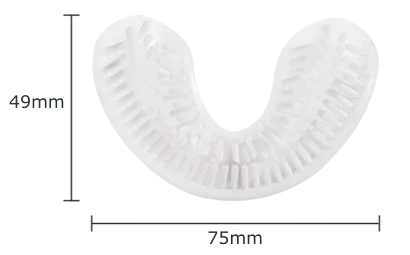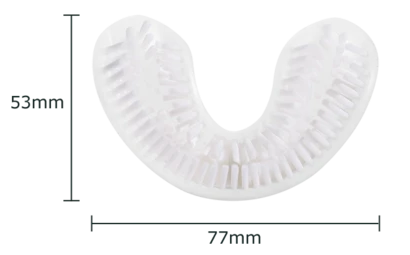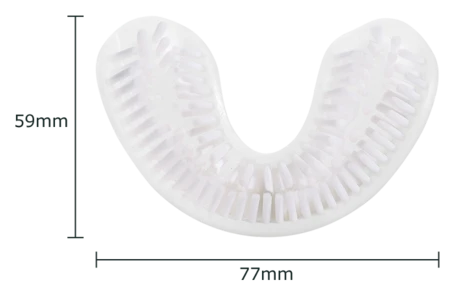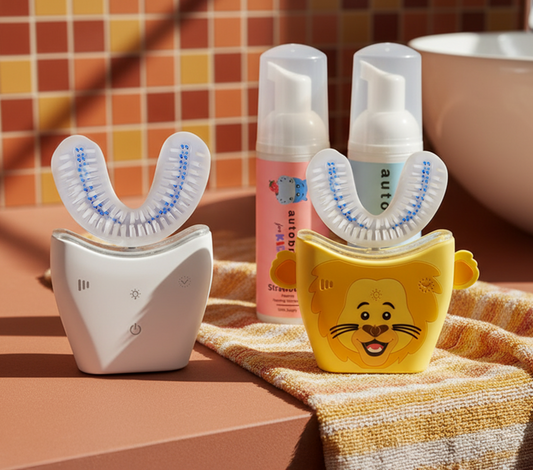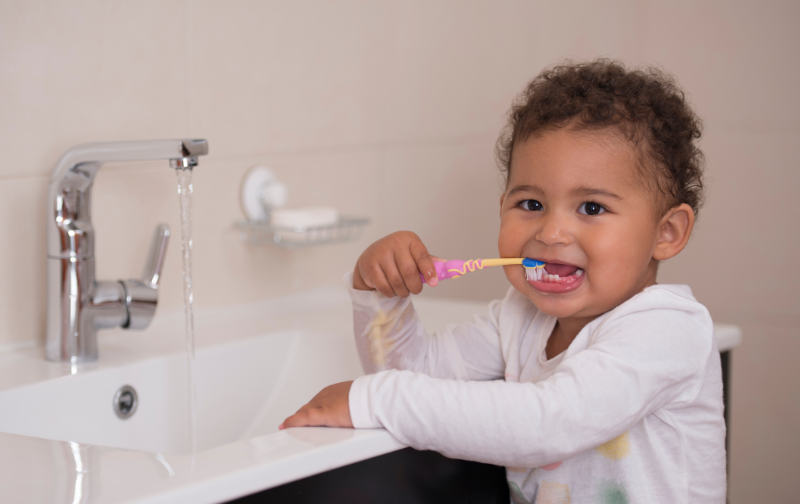
Do Cavities in Baby Teeth Really Need Fillings?

What is a cavity?
First, let's address what a cavity is. A cavity is tooth decay that is caused by bacteria in the teeth. Usually, this process starts when sugary or starchy foods are left behind on the teeth after eating. The bacteria gradually secretes acid which damages the teeth. The acid will erode the enamel over time which results in tooth decay and cavities.
Interestingly, the bacteria that cause cavities can actually be passed from parent to child. This can happen due to sharing, eating from the same utensils, or other similar activities. Parents who also have had a lot of cavities throughout their life are more likely to pass this bacteria to their children and cause more cavities. If you've struggled with cavities or tooth decay throughout your life, then you need to be extra vigilant with your child's teeth.
🦷️ Toothy Tip: Shop toothbrushes that kids actually WANT to use & clean every tooth perfectly, every time.
Obviously, foods that are high in sugar and starch can contribute to the problem. This can include many commonly consumed culprits such as milk, raisins, candy, cereal, bread, and even fruit juice. All of these foods will leave a sugary residue behind on the teeth which breed bacteria. The bacteria then produce damaging acid that erodes the enamel and causes plaque and cavities.
Are baby teeth more prone to cavities?
Baby teeth are similar to adult teeth in many ways. However, the coating of enamel on baby teeth is thinner than that on adult teeth. Thus, it is easier for the enamel on your baby's teeth to erode when it's exposed to bacteria and acid.
Another factor that makes baby teeth more prone to cavities is that they are unable to brush and floss on their own. Your little one is depending on you to do this, so it's easier for them to fall into poor dental hygiene. If you don't maintain your kiddo's teeth on a daily basis by brushing and flossing regularly, your child will be more prone to cavities.

🦷️Toothy Tip: Did you you know you can clean all your kiddos teeth in 30 seconds flat? See how here.
Finally, children by nature are more likely to be eating sugary and starchy snacks. There are many foods and drinks such as fruit juice and cereal that children love to consume. These are unfortunately terrible for their teeth and make children more likely to get cavities. You should monitor your child's intake of these foods to be sure they aren't consuming an excessive amount that could be damaging to their teeth.
Why do baby teeth decay more easily?
Baby teeth have less enamel which makes them more prone to tooth decay. High levels of bacteria in the mouth can also contribute to increased tooth decay in babies. Babies aren't born with these bacteria, but studies have shown that many babies are infected with it before the age of two. This is typically passed down from their parents. Once a baby has the bacteria in their mouth, they're more likely to get cavities throughout their life.
Antibiotics can’t treat the bacteria that cause cavities. Once bacteria are there, the only thing you can do is be very cautious and brush your child's teeth as frequently as necessary and avoid sugary foods. Better yet, try to avoid sharing utensils and toothbrushes with your children from the start so that you don't potentially transfer bacteria into your child's mouth.
🦷️Toothy Tip: Curious how to properly brush your baby’s gums & teeth? Read out the ultimate baby brushing guide here.
Which factors accelerate tooth decay in children?
Starchy & Sugary Snacks
There are several factors that can speed up tooth decay in your child's primary teeth. We've already discussed sugar and starchy foods. This is an easy way to speed up or slow down the rate of decay in your child's mouth. You can easily control their intake of these foods and keep them in moderation.
For example…
- Offer water instead of fruit juice
- Limit candy and cakes
- Be mindful of starchy foods such as bread, cereal, and crackers
- Be cautious of sticky foods like gummy bears and raisins.
Overall, reducing sugar intake is the best way to avoid cavities and prevent the acceleration of tooth decay in your child.
Lack of Proper Dental Care
You can also start teaching your child good oral hygiene habits from an early age. Start with a baby toothbrush when your child first gets teeth and begin introducing them to the feeling of the brush in their mouth. This will help slow down the growth of bacteria and tooth decay in your baby's mouth. It will also help set them up to be on a path of good oral hygiene throughout their life.

Daily brushing and flossing need to be started at an early age. Brushing is important to remove the bacteria from the teeth. Untreated cavities in baby teeth accelerate acid build-up that causes dental erosion. Your child can learn from watching you do this from a very early age. Be sure to use a toothpaste that contains fluoride or hydroxyapatite to better protect their teeth against cavities. (Learn the differences between fluoride and hydroxyapatite toothpaste here.) Consult with your pediatrician to find out their recommendations on when to introduce these.
🦷️Toothy Tip: Fluoride can be toxic for little children. Click here to shop kid-friendly fluoride-free toothpaste in the best flavors!
No Healthy Role Models
Another important factor is how you care for your own teeth. You are, after all, your child's best role model. If your child sees you exhibiting good dental habits, they are more likely to take care of their own teeth. Be sure you are brushing and flossing regularly and limiting your own sugar intake. This will give your child a healthy model to follow.
Signs that your child might need a dental filling
There are some situations when your child might need to have a cavity filled. None of us want to find ourselves in this situation, but if you do then it will need your prompt attention. You should always be careful to examine your kid's mouth daily when you brush their teeth and to look for signs of tooth decay or cavities.
If you see white spots beginning to form on your child's teeth, this is a sign that the enamel might be eroding. Your child's teeth might begin to have sensitivity and pain. They might report this if they are able to talk, or you might see them wincing when you brush and floss their teeth. Early cavities forming may also be light brown in color and will turn darker brown or black as it worsens.
It can be difficult if your child doesn't talk, but pain and sensitivity are always signs that there might be a problem. If you notice your child having sensitivity to certain foods or they avoid eating and drinking certain things that they like, this could mean they are having pain or sensitivity. These are signs that they might have a cavity or need a filling.
Would fillings in baby teeth create problems late in permanent teeth?
Fillings in a primary tooth will not create later problems. On the contrary, it is important to keep your child's mouth healthy because this can impact their teeth as an adult. If babies or children have tooth decay, they are more likely to also have dental problems as adults. Having crooked or discolored teeth can also damage your child's self-esteem, so it's important to keep them looking clean and healthy.
Home remedies for mild decay in baby teeth
If you are noticing the first signs of decay in your kid's teeth, you should start brushing and flossing daily. Use a toothbrush that is the appropriate size for your child's mouth and use a small amount of fluoride or hydroxyapatite toothpaste if approved by your pediatrician. Be sure to limit sugar and starch as discussed. Taking these steps can help to prevent the decay from further spreading and worsening. Early prevention is key.
🦷️Toothy Tip: Shop the best kids automatic sonic u-shaped toothbrush here.
How to reverse cavities in baby teeth?
It’s possible to reverse cavities in baby teeth but only if you start treatment in its early onset. You can halt the decay instantly if you improve your child’s dental hygiene and expose the decaying teeth to regular brushing and flossing. But this can only help reverse cavities that aren’t too deep. If the tooth decay gone too deep, you must get dental treatment for your child. The dentist may treat the cavity through fillings, crowns, root canals, and in extreme cases – extraction.

Conclusion
It is important to establish good oral hygiene habits from an early age. A child's teeth set the stage for their adult teeth's health and can also impact their self-image. There are simple steps you can take such as establishing good oral hygiene habits and controlling your child's diet that can make a huge difference in their oral health. You owe it to your child to set them up for success with their teeth in life.
While we can't always completely avoid tooth decay, there are steps we can take to prevent it. If you find that your child is still having issues despite these steps, you can consult a dentist and take steps to get a filling for your child's tooth. It is best to get professional intervention and help if you think that your child is suffering from a cavity. A professional can give you further guidance about what steps are necessary to fill your child's cavity.
What to Read Next...
⭐️ Everything You Need to Know About Your Preschooler's Teeth
⭐️ What is the Difference: Hydroxyapatite vs. Fluoride Toothpaste
⭐️ Clinical Study: The Science Behind AutoBrush






